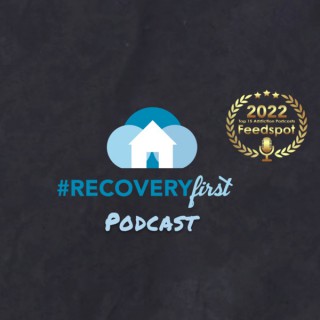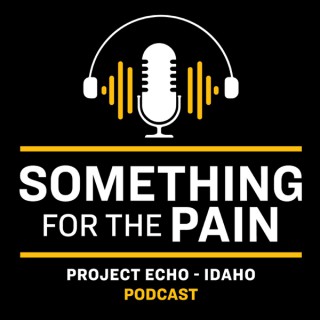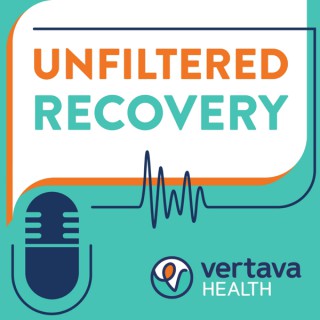Podcasts about substance use disorders
Continual use of drugs (including alcohol) despite detrimental consequences
- 769PODCASTS
- 5,182EPISODES
- 50mAVG DURATION
- 1DAILY NEW EPISODE
- Feb 23, 2026LATEST

POPULARITY
Categories
Best podcasts about substance use disorders
Latest news about substance use disorders
- Involuntary psychiatric patients face prolonged suicide risk post-discharge Mental health - National Elf Service - Feb 24, 2026
- Artificial intelligence enables faster detection of substance use disorder The Medical News - Feb 6, 2026
- What Losing My Brother Taught Me About Addiction, Shame, and Love Tiny Buddha - Feb 3, 2026
- Beyond testosterone: The real crisis in men’s health Just In | The Hill - Jan 28, 2026
- Notice to Expire PAR-25-023, "Device Based Treatments for Substance Use Disorders (UG3/UH3 Clinical Trial Optional)" NIH Funding Opportunities (Notices, PA, RFA) - Nov 24, 2025
- Heart Rate Variability Biofeedback Improves Early Substance Use Disorder Recovery Drugs.com - News for Health Professionals - Oct 10, 2025
- Boulder Care: Stephanie Strong & Marianna Zaslavsky The Health Care Blog - Sep 30, 2025
- The Addictions Men Over 45 Keep Quiet—And Why They’re Growing Clever Dude Personal Finance & Money - Sep 17, 2025
- PECARN STELAR Podcast – Episode 5: Addressing Substance Use Disorder in children and adolescents – The impactful role of the ED emDOCs.net – Emergency Medicine Education - Aug 25, 2025
- How capitalism kept a medication treatment away from patients with opioid addiction Liberation News – The Newspaper of the Party for Socialism and Liberation - Aug 17, 2025
Latest podcast episodes about substance use disorders
Lead: Medication Availability for Alcohol Use Disorder in Substance Use Disorder Treatment Facilities
Medication Availability for Alcohol Use Disorder in Substance Use Disorder Treatment Facilities JAMA Network Open This study examined the availability of medications for alcohol use disorder (MAUD) in SUD treatment facilities (SUDTF) from 2017 to 2023. Data was obtained from SAMSA's Mental Health and Addiction Treatment Tracking Repository. The percentage of counties with a SUDTF offering MAUD increased from 34% in 2017 to 50% in 2021. This increase leveled out between 2021 and 2023 perhaps related to the pandemic. Counties with a MAUD-offering facility were more likely to be metropolitan (57% vs 25%, p
Overcoming Addictions: Interview with Dr Kurt Bravata
Kurt grew up in a Christian home where his parents were very involved in ministry outreaches to the poor, outcast, and downtrodden. From a young age he was impressed by the joy and fulfillment of seeing lives restored and hope given to the hopeless. He determined early on that he wanted to follow Christ and make a real and lasting difference in people's lives. Although Dr. Bravata did not initially set out to become an addictionologist, he soon felt called by God to share his grace by helping to lead people out of lives of deeply rooted hurt, dysfunction, and addiction. As a Family Physician Dr. Bravata simply responded to the need for effective, evidence-based treatment of Substance Use Disorders in his rural patient population. This growing passion led Dr. Bravata to seek education in addiction medicine, become DATA 2000 waivered to prescribe buprenorphine, and eventually obtain Addiction Medicine Board Certification through the practice pathway provided by the American Board of Preventive Medicine (ABPM). Along the way, Dr. Bravata has been involved in local and national Family and Addiction Medicine leadership, education, and publication. To learn more about Dr Bravata, you can find him under the handle livefreeordiet on Facebook, X, Truth Social, and Instagram, or you can find his book at livefreeordiet.com or anywhere books are sold. Discover more Christian podcasts at lifeaudio.com and inquire about advertising opportunities at lifeaudio.com/contact-us.
Increased Risks of Major Cardiac Adverse Events in Stimulant Use Disorder as Compared With Other Substance Use Disorders
In this episode, Dr. Nicolas Garel joins the podcast to discuss findings from his new article in the September/October issue of the Journal of Addiction Medicine titled Increased Risks of Major Cardiac Adverse Events in Stimulant Use Disorder as Compared With Other Substance Use Disorders: A Propensity-score Matching Cohort Study. Dr. Nicolas Garel is a psychiatrist and clinician-scientist at the Centre Hospitalier de l'Université de Montréal (CHUM). He is an assistant professor in the Department of Psychiatry at the Université de Montréal and adjunct professor in the Department of Psychiatry and Behavioral Sciences at Stanford University. Dr. Garel completed his medical degree at the Université de Montréal, followed by his psychiatry residency and clinician-scientist fellowship at McGill University, and later pursued advanced training in research and addiction medicine at Stanford University. His research program focuses on innovative interventions for treatment-resistant mood disorders and substance use disorders. Article Link: Increased Risks of Major Cardiac Adverse Events in Stimulant Use Disorder as Compared With Other Substance Use Disorders: A Propensity-score Matching Cohort Study
Shavon Thompson / Throttle & Thrive / Healing Veterans & First Responders
Law Enforcement Life Coach / Sometimes Heroes Need Help Podcast
This week I had the pleasure of sitting down with the founder and director of Throttle & Thrive, A first responder and veteran, male only, recovery center located in the beautiful neighborhood of Palos Verdes Estates out in Cali. Shavon and I discussed her calling to establish this program and just as important the mission of saving lives within a community she and her staff care deeply about. Something she said to me really hit home. "We aren't just saving men from themselves, we are giving families back their fathers and husbands. If you or someone you know is struggling to get back to the man you once were, share this episode, give us a call and let's get it done! https://throttleandthrive.com/tel:805.701.1309More info on Shavon and Throttle & ThriveThrottle & Thrive is a men's only, 6-bed detox and residential (inpatient) substance misuse treatment program exclusively for First Responders and Veterans. We are a 12-step program and place emphasis on processing trauma through a variety of different modalities including EMDR. Throttle & Thrive is licensed by the Department of Health Care Services (DHCS) as a dual-diagnosis facility for Substance Use Disorder and Mental Health. We are accredited by the Joint Commission and accept most medical insurance policies.Thank you for taking the time to give this podcast a listen. If you would like more information on other Law enforcement Life Coach initiatives, our "Sometimes Heroes Need Help" wellness seminar or our One-On-One life coaching please visit :www.lawenforcementlifecoach.comJohn@lawenforcementlifecoach.comAnd if you would like to watch the interview you can view it in it's entirety on the Law Enforcement Life Coach YouTube Channel : https://studio.youtube.com/channel/UCib6HRqAFO08gAkZQ-B9Ajw/videos/upload?filter=%5B%5D&sort=%7B%22columnType%22%3A%22date%22%2C%22sortOrder%22%3A%22DESCENDING%22%7D
Hope and Healing - Conversations on Substance Use Disorder Treatment
This episode features an in-depth discussion with Tom, Director of Withdrawal Management and Residential Services, and Dani, Senior Director of Residential Services at CommQuest. Together, they explore substance use disorder as a medical condition—one that affects the brain, behavior, and overall quality of life, but is also highly treatable with the right support. Through clear, compassionate conversation, they address common misconceptions, the impact of stigma, and the real barriers that prevent individuals and families from seeking care.This episode also highlights how treatment has evolved to become more person-centered, evidence-based, and holistic, including integrated mental health care, medication-assisted treatment, withdrawal management, and recovery supports. Tom and Dani offer practical guidance for individuals considering treatment, as well as for family members supporting a loved one, emphasizing hope, education, boundaries, and the importance of seeking help. Their message is clear: recovery is possible, help is available, and no one has to navigate this journey alone.For more information about CommQuest please visit: https://www.commquest.org/
Recovery Beyond Sobriety: Healing Trauma Through Breathwork
Michaela shares her powerful recovery journey shaped by trauma, homelessness, substance use, and mental health struggles. After surviving a suicide attempt that became her turning point, she found healing through peer support, holistic practices, and breathwork. Now the Executive Director of Advocacy Unlimited, Michaela reflects on long-term recovery, embodied healing, and helping others reconnect with themselves beyond their circumstances.00:00 Intro & long-term recovery01:00 What Advocacy Unlimited does02:00 Childhood trauma and early substance use03:00 Pregnancy, getting sober, and pushing everything down04:45 Relapse, suicide attempt, and rock bottom05:30 Choosing to live and beginning recovery06:45 Early recovery and learning adulthood08:30 Education, identity, and rebuilding life10:30 Finding purpose through advocacy work12:00 Discovering holistic and mind-body healing14:30 Recovery beyond sobriety16:00 Breathwork and nervous system regulation19:00 Guided breathwork practice24:00 How breathwork changed relationships and work25:00 Advocacy Unlimited programs & resources28:00 How to get involved / closing ----Across the Web----
International Conference of Secular AA (ICSAA) 2025 - Psychedelics for Substance Use Disorder Presentation
This is the audio of the session "Psychedelics for Substance Use Disorder Presentation" meeting led by Dr. Philippe Lucas from Day 3 of Virtual ICSAA 2025. Recordings from the conference are being edited for public sharing and are being uploaded as they are made ready. Follow/subscribe to us on buzzsprout to be alerted as your favorite episodes are available. For information on ICSAA 2026 in-person in Phoenix next year, check out https://www.aasecular.org/icsaa-2026 and register now!Session Description: This presentation reviewed current clinical and observational research examining the impact of psychedelics on the use of alcohol and other substances, including clinical trials on psychedelic-assisted therapy for substance use disorders and real world evidence from the Global Psychedelic Survey 2025.For more info on secular AA including Zoom meetings, in-person meetings, and virtual gatherings, check out:- https://aasecular.org- secularAA@gmail.comSecular AA is AA sobriety that is neither religious nor irreligious, focusing on the practical, humanist tools of Alcoholics Anonymous and borrowed from the wider recovery community. Secular AA is a growing subculture within AA, offering 100 agnostic/atheist/freethinkers AA meetings every day + regional events and the International Conference of Secular AA (ICSAA). More @ https://aasecular.org
The Moment of Release: Rehabilitating Substance Use Disorder After Incarceration with Dr. Joshua Hall, FAOAAM – Episode 423
Release is not recovery, unless we build a bridge. In this episode, Sharlee Dixon is joined by Dr. Joshua Hall, FAOAAM, to examine what it truly takes to rehabilitate substance use disorder at the moment people leave incarceration, when the risk of overdose and recidivism is highest. Dr. Hall is the Medical Director and Senior Quality Officer at Crossroads Treatment Center and Chief Medical Officer at The Phoenix Center in South Carolina. Dual board-certified in Family Medicine and Addiction Medicine, he has dedicated his career to advancing compassionate, evidence-based care for individuals with substance use disorders, particularly those involved in the criminal justice system. Drawing from his clinical experience and personal journey, Dr. Hall shares insights into South Carolina's innovative soft re-entry model, a program that begins engagement during incarceration and continues seamlessly after release. The approach combines medication-assisted treatment, peer support, and continuity of care to intercept relapse, reduce recidivism, and support long-term stability. Together, Sharlee and Dr. Hall explore why the weeks following release are the most dangerous, and the most powerful, window for change, and how treating addiction as a medical condition, not a moral failure, can transform lives, families, and communities. For more information about Crossroads Treatment Center, please visit: https://www.crossroadstreatmentcenters.com Learn more about the Soft Re-entry Program, please visit: https://www.crossroadstreatmentcenters.com/soft-re-entry-program/ For more information about the Crossroads Annual Outcomes report, please visit: https://www.crossroadstreatmentcenters.com/2024-annual-outcomes-report/ If you would like to refer someone, call 877-848-9294 or visit: https://www.crossroadstreatmentcenters.com/refer-someone-now/ If you are an individual looking for support, please call 855-694-8288 Connect with Crossroads on Linkedin at: https://www.linkedin.com/company/crossroadscenters Connect with Crossroads on Instagram at: https://www.instagram.com/crossroadscenters/ Connect with Crossroads on TikTok at: https://www.tiktok.com/@crossroadscenters Connect with Crossroads on Facebook at: https://www.facebook.com/CrossroadsCenters
Substance Use Disorders Among Utah Women: A 2025 Update
In this episode, we discuss a recently released research snapshot titled, “Substance Use Disorders Among Utah Women: A 2025 Update.” This snapshot examines how substance use disorders (SUDs) affect women in Utah and across the United States. Using state and national data, the report explores whether Utah's patterns align with or diverge from national trends. The analysis highlights three key areas: prevalence and demographic differences in substance use among women; the intersection of women's health, pregnancy, and trauma; and current efforts and programs aimed at reducing substance use disorders throughout Utah. What stories do the data tell about women's experiences with substance use in Utah? We'll explore all of that and more in today's episode. Dr. Susan Madsen, an Extension Professor of Leadership at Utah State University and the Founding Director of the Utah Women & Leadership Project and A Bolder Way Forward, is joined by two guests. First, Corinne Clarkson, co-author of the report and Research Associate for the Utah Women & Leadership Project. Second, Rachel Denton, co-author of the report and a licensed clinical social worker. Support the show

















































































